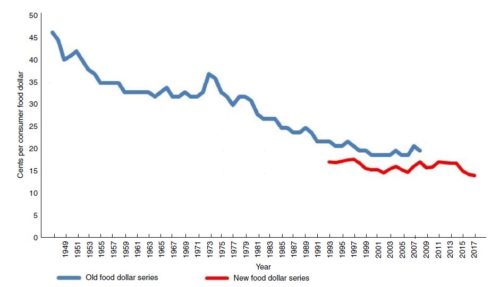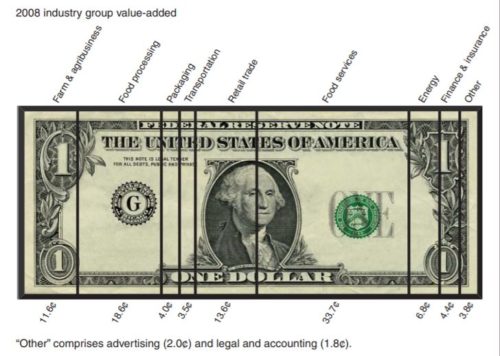The food system is unfair to real farmers
This study in Nature Food caught my eye: Post-farmgate food value chains make up most of consumer food expenditures globally.
The study examines the proportion of at-home food expenditures received by farmers in several countries, including the U.S.
For the U.S. it reproduces this USDA figure:

The caption:
Farm share of US consumer food expenditures. As reported in the USDA ERS food dollar series, the revenue share of consumer food expenditures has declined fairly consistently for 70 years. Data are from the USDA ERS…The new series is, on average, 3.5 cents per dollar lower than the old series over the 16 years of overlapping coverage. US real per capita incomes grew roughly 2% annually over this period.
The USDA’s Food Dollar series makes this clear.

What this means is that all but about 12 cents of every food dollar goes for processing, retail, food service, and everything else that happens to a food after it is produced.
As the authors of the Nature Food study put it,
There is already growing agreement that the most unhealthy foods are largely ultra-processed products that are high in such ingredients as salt, sugars and saturated fats, that is, manufactured post-farmgate. In the average American diet, for example, only about 30% of calorie intake comes from non-processed or
mildly processed foods.Ultra-processed foods also occupy a rapidly rising share of diets in developing countries as consumers seek greater convenience and safety. The environmental impacts of ultra-processed foods have not been properly accounted for in many studies, often considering the effects of the primary commodities used for production and disregarding the processing, packaging and distribution stages.
Likewise, the post-farmgate food processing sector is a major source of single-use plastics, greenhouse gas emissions, water use and effluent discharge.
We and the planet would be healthier eating foods that are less heavily processed. This would not only be good for us, but also for farmers.

